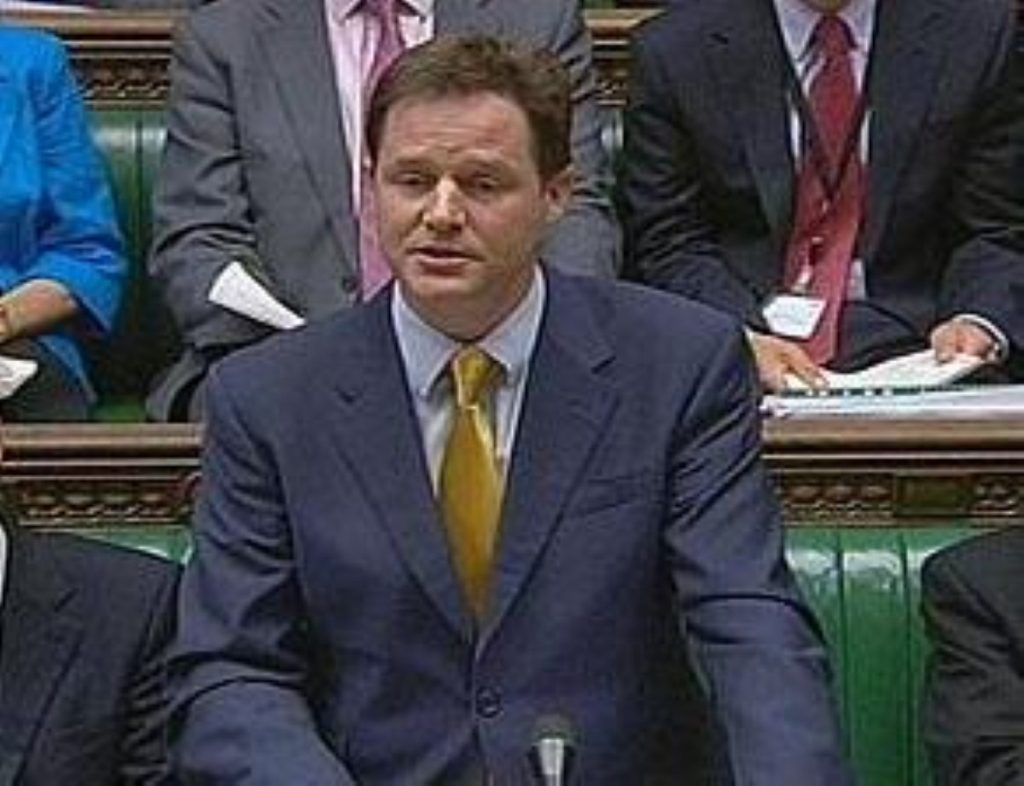PMQs sketch: Punchy Clegg is the right kind of lightweight
With David Cameron off in Washington trying to alter the leader of the free world's initial impression that he is a bit of a lightweight, this was an opportunity for Clegg to prove his own fighting credentials.
By Alex Stevenson Follow @alex__stevenson
But any brief, artificial moment of 'entente' Labour managed to foster with the Liberal Democrats vanished into the Westminster air this lunchtime.
This time yesterday shadow health secretary Andy Burnham was trying to foster a Lib-Lab "agreement" to oppose the coalition's unpopular NHS reforms, in a bid to fan the flames of a nascent backbench Liberal revolt.


His diplomatic overtures failed, Labour's motion was defeated, and any genuine hopes of a rapprochement made a quick rush for the exit. Up stepped Harriet Harman to take on Nick Clegg. It's been 16 long months the deputy PM's last outing at prime minister's questions, so this was an unusual opportunity for both sides.
Harman is a real veteran at this sort of occasion, and it showed. She gives off an atmosphere of utter imperturbability borne of indifference. It is the quiet placidity of a mother-of-ten completely relaxed with the chaos around her. Never mind all the shouting: this was about her, her briefing notes and looking over the top of her glasses at the deputy prime minister.
She was not in friendly mode. "The Liberal Democrats are making no difference," she said in her invariably earnest, insistent tone. It offers a very cool kind of contempt. She mocked Clegg for suggesting he thinks he's doing a "stunning job" on the NHS. She dismissed his attacks on Labour as "absolute rubbish" – a pleasantly direct form of to-and-fro. Harman may lack the get-up-and-go energy of Cameron and Miliband at PMQs, but at least she doesn't mince her words.
Clegg, full of beans, was feeling very pugnacious this lunchtime. At the peak of his performance the force of his rhetoric was such that he couldn't keep his feet still. He bounded back and forth, like John Cleese at his most agitated, or a prize fighter skipping around the ring. Those little strutting head movements, common to hens and nocturnal louts keen on 'starting something', seemed rather bracing at the despatch box. Cameron might not want to be labelled a 'lightweight', but that seemed exactly the category most appropriate for the deputy PM. In the best possible way, of course.
He repeatedly laid into the opposition over their record in government, especially on the NHS, and would have won outright had it not been for mincing his words right at the climax: "In government, the Labour party ran out of ideas – of money. In opposition they've run out of ideas."
Step forth Dennis Skinner, affectionately known as the Beast of Bolsover. This grumpy old man is well into his fifth decade in parliament and is now a master at winding up the Conservatives – so much so that he gets roars of support and derision just for standing up. "Come on!" impatient backbenchers yelled. "Get on with it!"
Eventually Skinner got going. He suggested to Clegg that, now Cameron and co were off "gallivanting around America" the deputy PM had a "chance to shine".
"What does he really, really think about this Murdoch sleaze and the latest development – the prime minister riding borrowed police horses?" Roars of appreciative laughter as Skinner, stooping forward more than seemed necessary even for a man of his advanced years, jabbed his finger.
"Man to man, what does he really think?" he continued, a growl entering his voice. It was like a father challenging his son to a fight. "Come on! Be a man!"
There followed a brief pause, in which the entire Commons yelled "More!" at the top of its collective voice. Skinner half got up, very happy to serve up some more where that came from. But he, like the Speaker, was interested in the answer.
Clegg declined to indulge in some private little reflections on Rupert Murdoch in front of the whole nation. "It was great," he said to the House after Skinner's contribution. Hollywood stars emerging from film premieres are less effusive. Clegg, who obviously views Skinner as a national institution, pointed out that he had been an MP for nearly 42 years. "I'm delighted to see in all that time he hasn't mellowed one bit." The deputy PM then sat down. Skinner, raising his arms in despair, smiled broadly. I think that might have just been a first.
Long gone are the days when Gordon Brown, the most lumbering heavyweight of them all, clunked his fist through these exchanges. His place was today taken by a nimble bruiser of a politician, a scrappy little terrier clearly game for a fight. All in all, a refreshing change from Cameron, whose polished rapier thrusts smoothly spearing their way into Miliband's chest we are now so depressingly familiar with.









